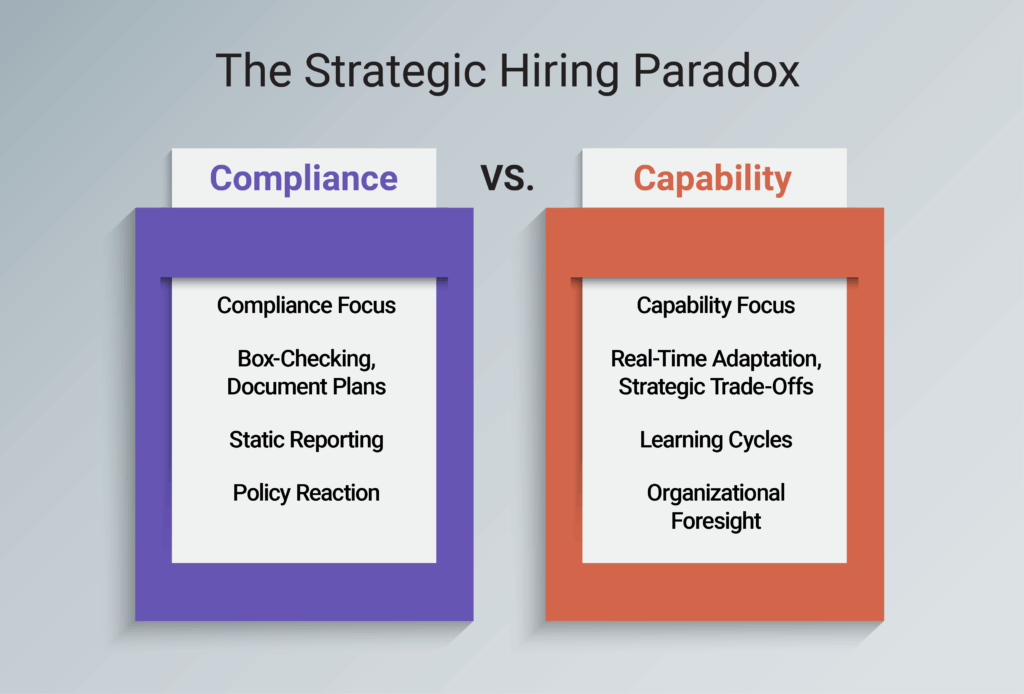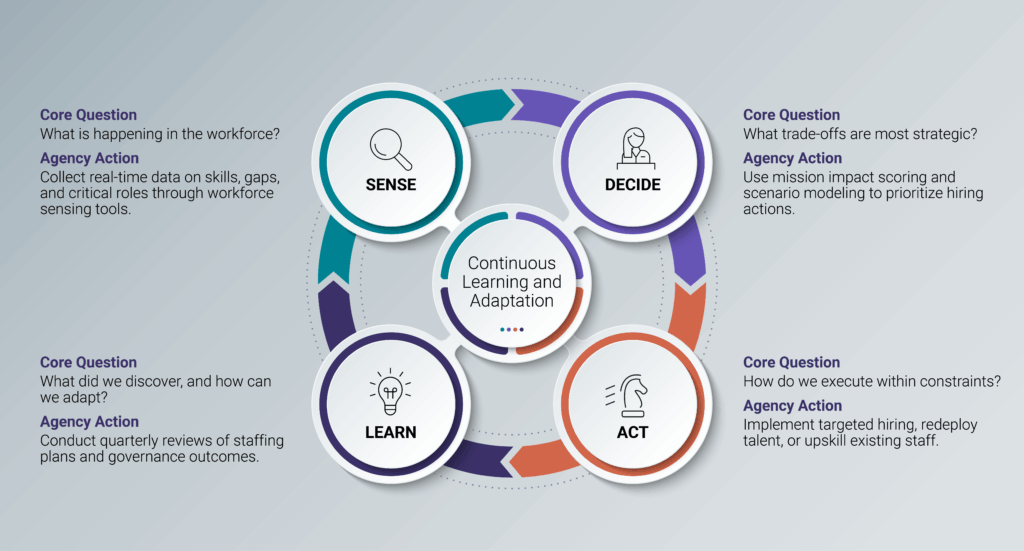
Written By
October 30, 2025

Why Federal Agencies Need New Capabilities, Not Just Compliance
By Alicia Rule, Mike Vajda, and Sharon Ginley
On October 15, 2025, the President signed an Executive Order fundamentally reshaping federal hiring: the Ensuring Continued Accountability in Federal Hiring directive. The order imposes a government-wide hiring freeze with narrow exceptions and establishes strict new governance mechanisms.
Every agency must now create Strategic Hiring Committees to approve any vacancy actions, produce Annual Staffing Plans aligned to administration priorities, and submit Quarterly Progress Reports to OPM and OMB.
For leaders navigating these realities, the Executive Order is more than a compliance hurdle, it’s a catalyst for rethinking workforce management under constraint.
The Strategic Hiring Paradox: Compliance Versus Capability
Reducing workforce size, as seen in the recent historic downsizing, can carry significant unintended consequences. For example, the loss of critical institutional skills can create gaps and necessitate rebuilding lost capabilities unless managed strategically.
Agencies must resist treating this Executive Order as a checklist of forms, approvals, and reports. That mindset turns governance into red tape, rather than an opportunity.
The challenge is to build lasting organizational capability within rigid hiring limits. This requires viewing the order not as an obstacle, but as a lever for workforce transformation.
Real change will require open and honest dialogue among leaders and stakeholders, moving past posturing toward genuine conversations about trade-offs, priorities, and value.

Three Critical Capabilities Federal Agencies Must Build
1. Real-Time Organizational Sensing
Most workforce data is static. Traditional HR reporting shows authorized positions and filled seats — but not dynamic realities of how work gets done or where critical expertise resides.
Agencies need systems that uncover mission-critical work, knowledge flows, and hidden bottlenecks. This visibility ensures hiring decisions align best with mission priorities.
2. Strategic Decision-Making Under Constraint
Agencies must ask:
Strategic Hiring Committees and workforce planners should rank work and roles by:
Explicit trade-offs help concentrate limited resources where they matter most.
3. Continuous Learning and Adaptation
Quarterly staffing plan updates offer an opportunity to turn compliance into organizational learning. Agencies can analyze what worked, revise assumptions, and adjust proactively. Embedding feedback loops enables continuous optimization — a key differentiator for resilient organizations.
The Sense–Decide–Act–Learn Cycle

By sensing workforce dynamics, making targeted decisions, executing with agility, and learning from outcomes, agencies can turn compliance into capability engines while honoring hiring restrictions.
Prioritization is central to the “Decide” stage, supported by tools such as:
This grounds decisions in mission data — not intuition.
Operationalizing Prioritization Through Governance
To make prioritization real, agencies can embed it directly into Executive Order governance:
This shifts reporting from “what we did” to “why we did it — and what difference it made.”
Supporting Leaders to Make Hard Choices
Prioritization depends on leadership alignment and clear data.
Golden Key Group helps agencies:
✓ Facilitate mission impact workshops focused on top priorities
✓ Build decision-support tools that clarify trade-offs
✓ Implement change strategies protecting lower-priority areas from destabilization
When hiring authority is limited, these mechanisms ensure every decision strengthens mission delivery.
How Golden Key Group Supports Federal Workforce Transformation
At Golden Key Group, we understand the tension federal agencies face. We partner with leaders to translate mandates into practical, mission-driven workforce strategies. Our expertise includes:
We help agencies move beyond compliance toward transformational workforce effectiveness.
Closing Call to Action
Federal agencies stand at an inflection point: treat hiring reform as a checkbox or use it to accelerate mission agility.
Agencies that thrive will prioritize with purpose, align talent to highest-value work, and build adaptive capacity even under constraints.
What’s your agency’s strategy for turning compliance into competitive advantage?
Join the conversation. Build capability. Lead with impact.